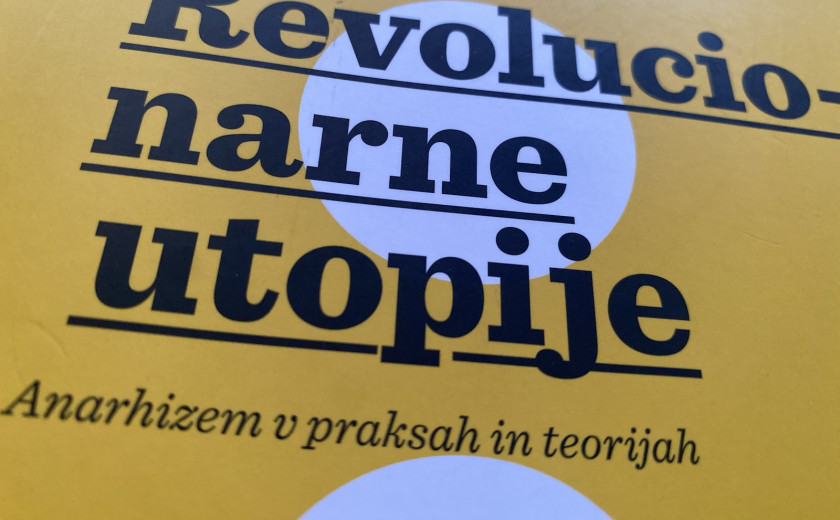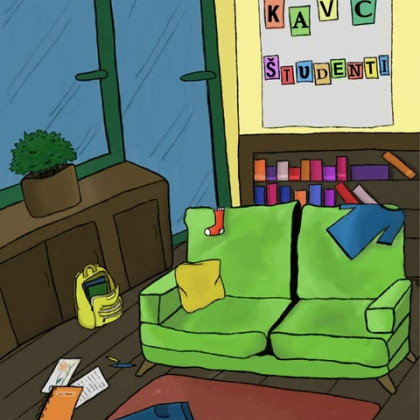Revolucionarne utopije
Intervju s tovarišico in avtorico knjige:
Daša Tepina: Revolucionarne utopije: anarhizem skozi prakse in teorije
-------------------
Novice iz Latinske Amerike z gostujočim tovarišem
MEXICO
The crisis between Mexico and Peru, where the Mexican president has gone much further than the rest of the countries that consider themselves part of the Latin American left, is the latest example.
This week, Peru expelled the Mexican ambassador in Lima, Pablo Monroy, for López Obrador's comments in which he accused the Peruvian Congress of a "soft coup" against Pedro Castillo - who tried to dissolve Parliament -, criticised them for being "very respectful of legality" and lambasted the new government of Dina Boluarte as repressive in the face of protests, words that Lima considered interference in internal affairs.
Despite the diplomatic wake-up call, the president maintained the tone of the comments, but the foreign ministry opted not to break off relations, according to the president himself.
On Friday, with Monroy already in Mexico and present at the morning conference, the president stressed that it was "a mark of pride to have our ambassador declared persona non grata for carrying out the mission of saving lives and asserting... the best of our foreign policy .... the right to asylum".
Since the last century, Mexico has been characterised by a foreign policy of non-intervention and non-interference in the internal affairs of other countries, a stance that avoided external scrutiny of its national policy and allowed the country to maintain relations with the United States, the Soviet Union, Cuba and China, while defending the self-determination of peoples and sovereignty in Latin America.
The undoubted tradition of asylum meant that those fleeing civil wars, armed conflicts or military dictatorships sought refuge in Mexico, and diplomatic ruptures were rare - with Germany under the Third Reich, with Franco's Spain, after the victory of the Sandinista Revolution in Nicaragua or with Augusto Pinochet's coup in Chile - because the so-called "Estada doctrine" (1930) was generally imposed, which circumvents the procedure of "recognition" of governments. This did not prevent periods of a certain "freezing" with some countries.
López Obrador has appealed to this principle in order not to pronounce himself on the new Peruvian leader but, above all, he insists that he will defend asylum and "non-intervention", although the latter concept is always subjective.
Since the beginning of the administration in December 2018, Mexico has tried to have Latin American leadership and, at the same time, strengthen its strategic - and not tension-free - relationship with its northern neighbour.
In Peru, Mexico joined Argentina, Colombia and Bolivia in a statement of support for Castillo, but the Mexican leader was his most ardent defender, comparing his offer of asylum to the one he gave to Evo Morales - although the Bolivian did not attempt to dissolve parliament - and distancing himself from the positions of other allies such as Brazilian president-elect Luiz Inacio Lula da Silva and Chilean Gabriel Boric.
PERU
Around 100 leaders of the Puno region decided to restart the indefinite protest for the resignation of Dina Boluarte and general elections in 2023. Amador Núñez, president of the Puno Popular Organisations Front (FOP), moderated the session.
Judiciary evaluates appeal against former president's remand in custody: Former president Pedro Castillo asks to be remanded in custody with restrictions. The Permanent Criminal Court presided over by César San Martín will evaluate the appeal.
The Permanent Criminal Chamber of the Supreme Court of the Judiciary scheduled for Wednesday 28 December at 9.00 a.m. the appeal hearing against the 18-month pre-trial detention of former president Pedro Castillo for his attempted coup d'état. This, within the framework of the investigation for the alleged crimes of rebellion, conspiracy, abuse of authority and serious disturbance of public peace.
Government seeks dialogue with unions to avert strike
Broken bridges. Organisations in Puno reject dialogue with Boluarte and consider her a usurper. Minister of Development and Social Inclusion argues that calling for the president's resignation is a mistake; the legislature, which has been delegitimized with almost 90% disapproval, would assume power.
The restart of the social protests is set for 4 January. In Puno, the unions met yesterday at the Casa del Maestro and agreed on that date. The measure of force will be observed in the 13 provinces of the region. As for the social demonstrations, they will feature a march to Lima, which they will call the "Cuatro Suyos" (Their Four).
In Arequipa, the regional platform is meeting to decide whether to adhere to this date. The president of the Frente Amplio Cívico de Arequipa (FACA), Ramón Pacha, reported that they will insist on early elections and the closure of the Congress of the Republic.
Some leaders from the macro-region confirmed their attendance. Meanwhile, the central government is trying to build bridges of dialogue, but without much success.
At least that is the version given by the Minister of Development and Social Inclusion, Javier Demartini, during his visit to Arequipa. The leaders of Puno rejected any rapprochement with a government they consider "usurper".
The head of Midis indicated that the Executive is prepared to sit down with leaders to begin talks, and even asked the elected authorities to convey this position to the popular leaders.
--------------------
Živa sila
------------------------
Zgodovinski opomnik: Guy Debord
Guy-Ernest Debord se je rodil 28. decembra 1931. Otroštvo, turbulence druge svetovne vojne in mladost je preživel v južni Franciji, družinsko varno umeščen v udobno meščansko okolje. Svoja dvajseta in trideseta leta je preživel večinoma v Parizu, drugo polovico življenja pa med Italijo, Španijo in Francijo. Celo življenje je pozorno spremljal burna politična dogajanja, vanje pa je znal tudi učinkovito intervenirati, zaradi česar se ga je v nekaterih krogih prijel sloves pronicljivega analitika, stratega in teoretika kapitalizma oziroma razrednega boja.
Pri devetnajstih letih se je Debord na filmskem festivalu v njegovem tedaj domačem Cannesu srečal s tolpo umetnikov, ki so si prizadevali nadaljevati in nadgraditi revolucionarno dediščino dadaizma in nadrealizma. Pridružil se je letrističnemu gibanju in se preselil v Pariz. Medtem ko je njegova družina dolgo živela v prepričanju, da mladi Guy v prestolnici pridno študira pravo, je on raziskoval meščanskemu očesu nevidne plasti mesta z bogato revolucionarno zgodovino.
Tovarišice, sopotnike in navdih je Debord našel v kafičih in pajzlih prestolnice kolonialnega imperija, vpletenega v vojne zoper osvobodilna gibanja v Alžiriji in Vietnamu; isto mesto je bilo hkrati tudi oporišče upornega delavskega razreda in mnogih ljudi, ki so bili tako ali drugače porinjeni na rob družbe. Ravno ob boku slednjih je tudi sam našelsvoje mesto v družbi: ob boku punc, ki so pobegnile iz cerkvenih vzgojnih zavodov, dezerterjev iz vseh vojska na kontinentu, avantgardnih umetnikov, političnih in drugih migrantov, tistih, ki so pobegnili pred železnim prijemom tradicionalne družine, malih kriminalcev in drugih ljudi brez za meščansko družbo sprejemljive prihodnosti.
Oborožen z lucidnostjo pariške ulice, lekcijami preteklih revolucij in osebno strastjo po neodtujenem življenju je Debord bral, pisal, snemal filme in sestankoval. Leta 1957 je združil moči s peščico neetabliranih umetnikov, arhitektov, pesnikov in drugih pridaničev, ki si od obstoječega režima niso ničesar obetali, in nastala je Situacionistična internacionala. Njen projekt: vrniti revolucijo v jedro zahodne Evrope in prispevati svoj del k zmagi protiavtoritarnega delavskega razreda v njej. Skoraj deset let si je Debord aktivno prizadeval za izgradnjo analize in programa, ki bi delavskemu razredu po celem svetu omogočil prelom s kapitalizmom v vseh njegovih različicah: s tistim v podobi države blaginje, z državnim kapitalizmom pod taktirko avtoritarnih komunističnih partij pa tudi s kolonializmom oziroma tedaj že vzpostavljajočim se režimom neokolonializma.
Maja 1968 je bil – ne več rosno mlad – Debord več tednov na ulici, na barikadah, v zasedenih stavbah, v stalnem propagandnem in organizacijskem pogonu in prepričan, da sodeluje v prevratu, za katerega si je prizadeval vsa leta prej. Po porazu revolucije je nadaljeval filmsko delo, prevajanje, založništvo – vseskozi v produktivnem stiku s številnimi radikalnimi gibanji po Evropi.
Do anarhizma je imel Guy Debord kompleksen odnos. Bil je kritičen do tistega, kar je prepoznaval kot rigidnost anarhistične politike,ki se na posamične situacije boja pogosto odzove s ponavljanjem istega enostavnega vzorca in tako ignorira ne samo kompleksnost konkretne situacije, temveč tudi njene priložnosti. Po drugi strani pa je bila v jedru njegovega življenja in dela ideja organizirane decentralizirane antiavtoritarne revolucije, utemeljene na ideji solidarnosti, vzajemne pomoči in odprave vseh vrst odtujenosti ter sleherne prisile. Prav tako se je osebno angažiral v podporo številnim zaprtim oziroma preganjanim anarhističnim tovarišem. Leta 1980 je denimo imel kar nekaj prstov vmes pri kampanji španskega anarhističnega gibanja, zaradi katere je bilo več kot 50 anarhistov izpuščenih iz tedaj že kar nekaj časa »demokratičnih« zaporov postfrankistične Španije. Med drugim je za potrebe kampanje napisal pamflet z zahtevo: »Naj bo jasno, da zahtevamo izpustitev vseh (...), tudi nedolžnih.« Bila je izpolnjena.
Debordova dela so dolgo prevajali, tiskali ter ohranjali v obtoku predvsem v anarhističnih krogih po vsem svetu, saj je ravno v njih njegovo teoretsko in politično delo naletelo na najbolj plodna tla. Guy Debord, teoretik, pisec, prevajalec, režiser, založnik in še veliko drugega, je umrl 30. novembra 1994.











Dodaj komentar
Komentiraj